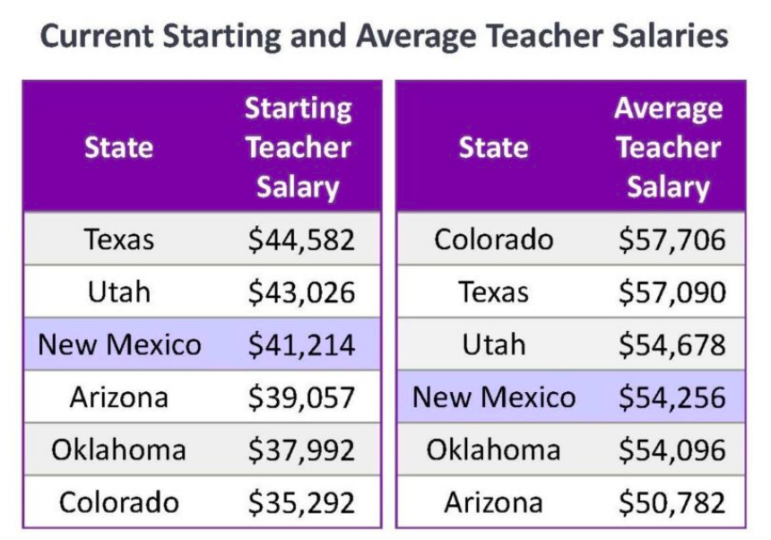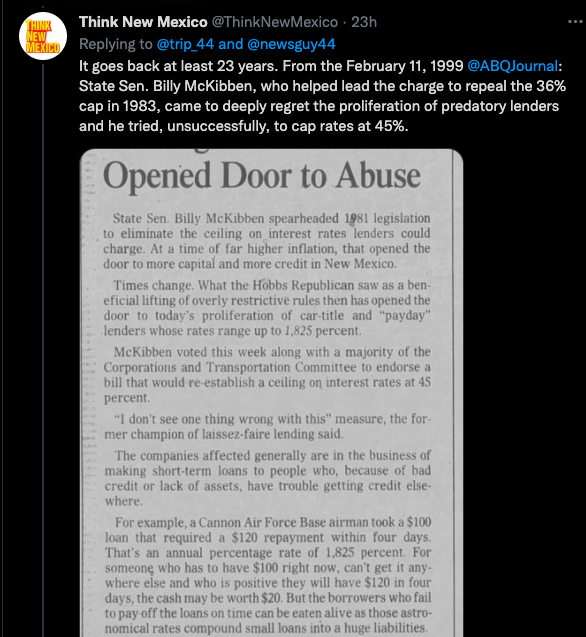New Mexico lawmakers made consequential changes for the state’s most vulnerable people during the short 30-day legislative session this year, made possible by a tidal wave of cash.
Top of the list of consequential bills is the big boost in teacher pay. Lawmakers bumped salary minimums for Level 1, 2, and 3 teachers to $50,000, $60,000, and $70,000, respectively, a major goal of Gov. Michelle Lujan Grisham and legislators who publicly declared their intention to make New Mexico’s teachers the best paid in the region. Compared to states like Texas, Utah, Arizona, Oklahoma and Colorado, they’re about middling right now.
The hope is the increases will sweeten the allure of teaching. Vacancies among the state’s teaching ranks are high and growing. According to the Public Education Department, there were 1,048 vacant teaching positions, nearly double the 571 reported last year. The problem will likely be exacerbated by a coming surge in retirements among baby boomers.

Lujan Grisham and lawmakers are banking on the higher pay helping out with the twin challenges of low-pay and increased retirements. Hopefully, New Mexico’s children will win.
Lawmakers also passed a law to provide free college to students who haven’t already completed a degree. The Opportunity Scholarship Act will cover all tuition and fees to all degree-seeking undergraduate students of any public state or tribal college in New Mexico. To qualify, students must take between six and 18 hours during the fall and spring semesters and maintain a 2.5 grade point average. To maintain the scholarship from start to finish, they wouldn’t be allowed to take a semester off.
Billed as a scholarship, eligible students automatically qualify when they’ve obtained a high school diploma or equivalent. What the act doesn’t do, though, is cover living expenses, which often exceed the cost of tuition and fees. Nonetheless, this act will likely make college more in reach for low to middle income students.
Lawmakers also passed an automatic child income tax credit that people with children will be able to claim when they file their taxes each year, through 2026. The amount of the credit is higher for the lowest income New Mexicans, and can be claimed for each of their dependent children. These credits will either reduce income tax owed, or result in cash refunds.
A tax package, HB163, included the child tax credit. It also removed state income tax from the social security payments of low- to middle-income people.
Then there was the big cash infusion lawmakers agreed to for the New Mexico’s Housing Trust fund. Lawmakers earmarked 2.5% of the state’s annual senior severance tax bond capacity, which will immediately pump around $25 million each year into the fund. For perspective, since 2005 when the fund was created, it’s grown to $34 million today. Analysts say that money has been leveraged to bring in money from other sources, with a total of $698 million spent on helping people access housing.
Along with the rest of the country, New Mexico is experiencing a housing crisis. The results: prospective homeowners priced out of buying. Same for people looking to rent as skyrocketing rents give an advantage to landlords who can pick and choose. Beyond that a legion of low-income families are barely hanging onto shelter by their fingertips. The big boost in funding should go a long way to alleviate the suffering of these families struggling to find housing. What lawmakers failed to pass was legislation that would have strengthened protection against eviction, a major priority for organizations working to alleviate homelessness. It cleared the House but bogged down in the Senate.
Low-income New Mexicans also will benefit from capping interest rates on short-term loans at 36% that passed this session. It’s been a perennial aspiration, but has never succeeded.
Until this week at the New Mexico Legislature.
Currently, New Mexico caps interest on these loans at 175%, itself a reduction from previous rates that state lawmakers imposed a few years back.
New Mexico In Depth wrote about this issue back in 2015, profiling a person who found themselves in a never ending spiral of debt, trapped by a high interest rate of 360%. The issue isn’t a new one. Think New Mexico, an advocacy organization based in Santa Fe, reminded us on Twitter after the bill passed that efforts to cap interest rates began almost a quarter century ago, in 1999, after a cap on interest rates was lifted in 1981. A 1999 Albuquerque Journal headline about the legislative effort: Raising Loan Roof Opened Door to Abuse.

Lawmakers debated whether capping interest at 36% interest limit would make lenders less likely to operate in New Mexico, but that fear doesn’t seem borne out by research. Currently New Mexico has some of the highest allowable interest rates in the nation.
Low-income people who every day scramble to piece together enough to get by are the clear winners of this legislation. Almost half of the borrowers from storefront lenders made less than $25,000 per year, according to 2012 research by the Pew Charitable Trusts.
Not passing this session was an omnibus elections bill that would have expanded access to voting, especially for Indigenous populations and certain felons. Republicans in the Senate outmaneuvered the majority Democrats, first with a call of the Senate last week, and a filibuster on Thursday by GOP senator Bill Sharer of Farmington, who talked for two hours to run out the clock.
The pandemic made it hard for a lot of people to vote in the 2020 elections, but it was just a magnification of current challenges.
We saw those hit Native communities in 2020, in particular. The failed bill would have made permanent access to ballot drop-boxes, helped people access and maintain their voter registration, and dropped unnecessary steps people must take to vote by mail regularly.
It also would have enfranchised those who’ve committed a felony but are not incarcerated, people who are making their way through parole or probation, many trying to reintegrate into society. In a country that leads the world in the number of people it locks up, who are disproportionately from communities of color, efforts like this one deserve serious attention.
In case you’re wondering, here’s what a filibuster looks like, image courtesy of the NM Senate Democrats Twitter feed, modified by New Mexico In Depth:
